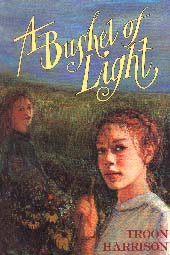|
________________
CM . . . .
Volume VII Number 13 . . . . March 2, 2001
excerpt: So I kept humming...and staring around the kitchen. This house is getting worse, I thought. The stove needed blacking, and the pine floor was covered with dust and grit and crumbs. The lamp glass was smoky and dark. On the table, the oilcloth was so old that there were holes in it, and its pattern of grapevines was worn pale and faint. The candles were almost all gone, and the butter would go sour if it wasn't taken to town and sold soon. The eggs were piled in a basket in the pantry, waiting for someone to make icing glass to store them in for next winter. In the hall, the rug needed to be taken out and beaten. Everywhere I looked, there was work waiting to be done. But Kathleen ignored it all, and I couldn't keep up with it. Things would go on getting worse.The bond between twins is known to be strong, and between identical twins even stronger. Maggie and Thomasina are two halves of a whole until they are six when their father is drowned and their mother dies in childbirth. For a short time, they remain together while living with their uncle and his family, but then Maggie is sent first to the Bernardo Home in London, England, and then on to Canada to the Howard farm near Peterborough, ON. Thomasina stays behind in Wales to look after an aunt. Maggie, while missing her twin desperately, resents that she has to slave on the farm far from home while Thomasina, obviously the preferable and preferred twin, is living with family who love and care for her. When she is 14, Maggie begins having very troubling dreams about Thomasina, and she determines to run away and find her. This is easier thought of than done, however. The work on the farm where she is living has become almost the sole responsibility of herself and the hired man since the drowning deaths of two of the sons of the family. Kathleen, the deceased children's mother, has slipped deeper and deeper into somnolence and depression, and Matthew, their father, into caring only for his horses. Four-year-old Lizzie is looked after by Maggie or no one. Maggie's present arrangement is meant to last until she is 21, but running away really is not possible until she can arrange that Lizzie and Kathleen be cared for by Kathleen's rich Toronto sister. Then Maggie does take off and finds Thomasina who has also (fortuitously) been sent to Peterborough following the aunt's death. They are reunited, misunderstandings (it was mere happenstance that sent Maggie to Canada and Thomasina to Wales) are explained away, and a happier future for them both is tidily arranged. A bit too tidily, perhaps. It is perhaps not unreasonable that Thomasina should be sent to Peterborough by Bernardo's, given that it has an established orphanage there. It stretches coincidence only a little that Maggie should be taken there, herself, when she falls ill after running away from the farm. That the very person who might be interested in hiring her as a domestic should be the one to come to help organize a fund-raising fete at the orphanage, however, is a bit much, and then that she should live in the one house that Maggie had particularly admired on her way into town. Very tidy, as I said. What disturbed me more about the story, however, was that I felt so little sympathy for Maggie and her difficulties. She managed to be friends with the girl on the next farm and to fall somewhat in love with the brother, but she developed very little fondness for the Howard family with whom she lived. Even Lizzie, whom she had practically raised from birth, was a burden to be shed as soon as possible. It took a fire in a neighbour's house to make Maggie realize that she cared for her at all! And they parted company with no regrets, apparently, on either side. Perhaps it is that the author has just got the symbiotic relationship between the twins very right---they have no room for other close relationships in their lives! On the other hand, Lizzie "was" a burden, her mother a depressed lump, her father a tyrant, and the one remaining brother an unhappy and spiteful adolescent! The fact that, once Maggie and Thomasina make contact again, each feels the desire to distance herself from the other, augurs better for future relationships than had they melded into their original closeness. On the whole, the story flows smoothly and sheds an interesting light on the way children were shipped about the world, useful commodities in a time of labor shortage. It might just strike a young reader that his or her life could be a lot worse! Recommended. Mary Thomas works in two elementary schools in Winnipeg, MB, and finds historical fiction a good basis on which to hang historical facts.
To comment on this title or this review, send mail to cm@umanitoba.ca.
Copyright © the Manitoba Library Association.
Reproduction for personal use is permitted only if this copyright notice
is maintained. Any other reproduction is prohibited without
permission.
Published by
TABLE OF CONTENTS FOR THIS ISSUE - March 2, 2001.
AUTHORS |
TITLES |
MEDIA REVIEWS |
PROFILES |
BACK ISSUES |
SEARCH |
ORDER |
CMARCHIVE |
HOME
|
